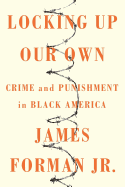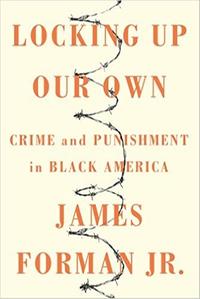
 Yale Law Professor James Forman Jr. uses comprehensive research, his personal experience as a public defender in Washington, D.C., and an open mind to illustrate how the crisis of mass incarceration in the United States was constructed incrementally over a 40-year period, examining in particular the role that African Americans unwittingly played in that effort, which has made the U.S. the world's largest jailer.
Yale Law Professor James Forman Jr. uses comprehensive research, his personal experience as a public defender in Washington, D.C., and an open mind to illustrate how the crisis of mass incarceration in the United States was constructed incrementally over a 40-year period, examining in particular the role that African Americans unwittingly played in that effort, which has made the U.S. the world's largest jailer.
Using examples from D.C.'s legislation and law enforcement history, Forman, a former clerk for Supreme Court Justice Sandra Day O'Connor, demonstrates that decisions at the state and city level are the bricks and mortar of the U.S. prison situation. Part One of Locking Up Our Own looks at the origins of mass incarceration: the war on drugs, gun control and the rise of African Americans in politics and law enforcement.
Despite some successful state-level efforts in the 1970s to decriminalize marijuana, black lawmakers and communities railed against the movement. They wanted to eradicate the drug's use from their ranks, viewing it as debilitating, harmful and, worst of all, a gateway to heroin. Forman quotes Atlanta's first black mayor, Maynard Jackson: "We cannot change anything when we do not have weapons in hand--not guns and knives--but your brains and discipline." In this area, as in others Forman covers, the logic behind lawmakers' and voters' choices to be tough on crime is an effort to help the African American communities. However, they result in different consequences altogether, which Forman goes on to examine in the second half of his book.
When black leaders in D.C. fought for and convinced the people that guns should be illegal, their motivation was to stop the hemorrhaging of black lives through black-on-black crime. Instead, guns flowed in from other states, and "stop and search" tactics resulted. Stop and search efforts uncovered few gun violations but an overwhelming number of minor drug offenses, with the potential to destroy people's livelihoods. Through these and other eye-opening examples, Forman enlightens readers about not only African Americans' contributions to the mass incarceration epidemic but also how well-meaning choices end up having a detrimental effect on the people they were most intended to protect.
Forman's comprehensive research and analysis, as well as his compassion and personal experiences, make Locking Up Our Own a powerfully important and accessible glimpse at the U.S.'s punitive criminal justice system. His observation that the country always makes room in prisons, but can't do the same in drug treatment centers, is telling of misplaced priorities. Furthermore, he recognizes that repetitive efforts to treat root problems such as education, income inequality, employment and health care rarely, if ever, take precedence over punishment. Forman's voice is one of logic and reason, and in his epilogue it is also one of benevolence: "What if we strove for compassion, for mercy, for forgiveness?" The U.S. has always struggled for justice of various kinds, and now Forman offers a strong case for the world's largest jailer to consider humanity. --Jen Forbus, freelancer
Shelf Talker: A former public defender analyzes the role African Americans play in the country's mass incarceration epidemic and how hindsight reveals their good intentions to be highly detrimental.

